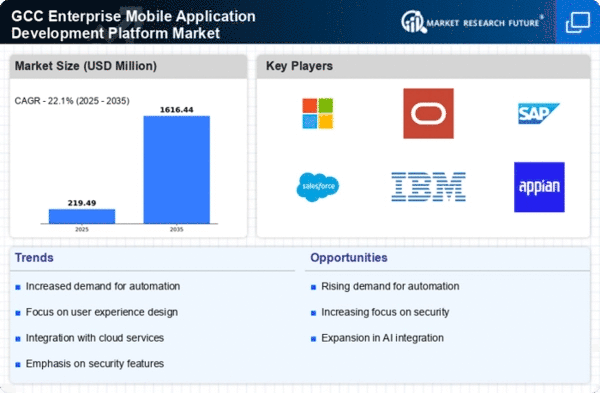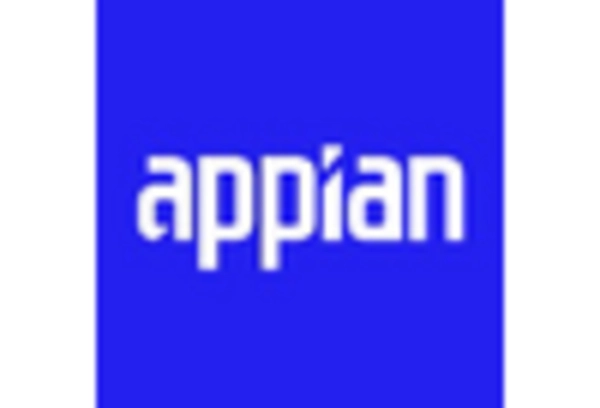The enterprise mobile-application-development-platform market is currently characterized by a dynamic competitive landscape, driven by rapid technological advancements and increasing demand for mobile solutions across various sectors. Key players such as Microsoft (US), Oracle (US), and SAP (DE) are strategically positioned to leverage their extensive resources and expertise. Microsoft (US) focuses on integrating AI capabilities into its platforms, enhancing user experience and operational efficiency. Oracle (US) emphasizes cloud-based solutions, aiming to streamline enterprise processes and improve scalability. SAP (DE) is investing in partnerships to expand its ecosystem, thereby enhancing its service offerings and market reach. Collectively, these strategies contribute to a competitive environment that is increasingly centered around innovation and customer-centric solutions.
In terms of business tactics, companies are increasingly localizing their operations to better serve regional markets, optimizing supply chains to enhance efficiency. The market structure appears moderately fragmented, with several players vying for market share. However, the influence of major companies is substantial, as they set benchmarks for technology and service standards, thereby shaping the competitive dynamics.
In October 2025, Microsoft (US) announced the launch of its new AI-driven mobile application development toolkit, which aims to simplify the development process for enterprises. This strategic move is significant as it not only enhances Microsoft's product offerings but also positions the company as a leader in integrating AI into mobile application development, potentially attracting a broader customer base.
In September 2025, Oracle (US) unveiled its latest cloud platform enhancements, which include advanced analytics and machine learning capabilities tailored for mobile applications. This initiative is crucial as it underscores Oracle's commitment to providing cutting-edge solutions that meet the evolving needs of enterprises, thereby reinforcing its competitive stance in the market.
In August 2025, SAP (DE) entered into a strategic partnership with a leading regional telecommunications provider to enhance mobile application capabilities for businesses in the GCC. This collaboration is likely to expand SAP's reach and improve its service delivery, reflecting a trend towards strategic alliances that enhance technological capabilities and market penetration.
As of November 2025, the competitive trends in the enterprise mobile-application-development-platform market are increasingly defined by digitalization, sustainability, and the integration of AI technologies. Strategic alliances are becoming pivotal, as companies seek to combine strengths and innovate collaboratively. Looking ahead, competitive differentiation is expected to evolve, with a shift from price-based competition to a focus on innovation, technological advancement, and supply chain reliability. This transition may redefine how companies position themselves in the market, emphasizing the importance of agility and responsiveness to customer needs.

















